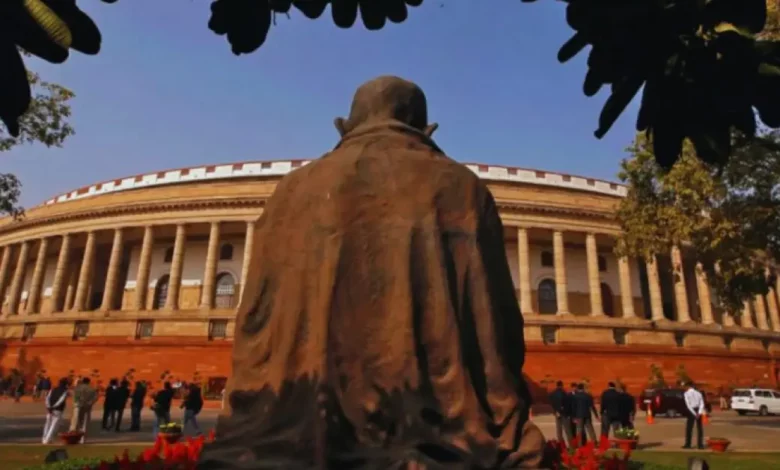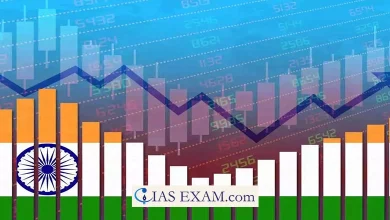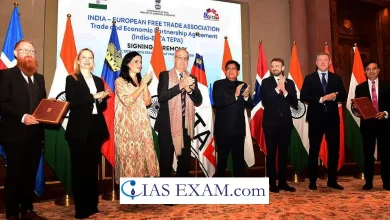Decline of Parliamentary Practices and Polarisation of Indian Politics
GS Paper 2 - Indian Polity, Parliament and State Legislature

Context – This article highlights the concern and decline in parliamentary practices and the polarization of Indian politics, particularly in the lead up to the General Elections. It discusses the divisive nature of the recent parliamentary sessions, the erosion of democratic principles and the growing rift between the ruling party and the opposition.
It emphasizes the need for adherence to constitutional mandates, the preservation of federalism, and the importance of managing differences within a rules-based order to safeguard India’s democracy.
Key Highlights
India, as the world’s largest democracy, has long prided itself on its robust parliamentary practices and traditions. However, in recent years, there has been a noticeable decline in these practices accompanied by a concerning rise in political polarization.
- The final parliamentary session recently before the general election was marked by divisiveness and acrimony between the ruling party and the opposition.
- Despite external stability, internal challenges persist, including potential flashpoints like the farmers’ agitation in Punjab and Haryana and unrest in the northeast.
- There is heightened polarization in Indian politics, with the Prime Minister accusing the opposition of divisive tactics and vice versa.
- Issues such as the construction of the Ram Temple in Ayodhya and attempts to enforce an Uniform Civil Code have become politicized, further exacerbating divisions.
- The erosion of federalism is noted, with the ruling party accused of centralizing power and undermining regional parties.
- Engineered defections to the ruling party raise concerns about the integrity of the electoral process and democratic principles.
- The role of Governors in opposition-ruled states is contentious, with accusations of central interference leading to strained Centre-State relations.
Decline in Parliamentary Practices:
- Parliamentary democracy thrives on principles of debate, discussion, and consensus-building. However, in contemporary Indian politics, these principles seem to be eroding.
- One of the primary reasons for the decline in parliamentary practices is the increasing tendency towards disruption and obstructionism.
- Sessions of Parliament, instead of being platforms for constructive dialogue, often descend into chaotic scenes of shouting matches and walkouts.
- The decline in parliamentary decorum can be attributed to several factors. Firstly, the growing politicization of parliamentary proceedings has turned them into battlegrounds for scoring political points rather than platforms for meaningful deliberation.
- Secondly, the erosion of institutional norms and the rise of a confrontational approach to politics have further exacerbated the situation. Additionally, the frequent adjournments and disruptions have impeded the legislative process, leading to a backlog of crucial bills and reforms.
Instances and Events
- The farmers’ agitation in Punjab and Haryana.
- Tensions between the Centre and opposition-ruled states.
- Instances of engineered defections to the ruling party.
- Accusations of central interference in the functioning of opposition-ruled states.
- Passage of resolutions in Parliament on contentious issues like the Ram Temple in Ayodhya.
Polarization of Indian Politics:
- Political polarization, characterized by the deepening divide between ideological camps, has become a defining feature of Indian politics. This polarization is evident not only within the political class but also among the electorate.
- The emergence of identity-based politics, fueled by religious, caste, and regional considerations, has contributed to the widening rift between different segments of society.
- One of the primary drivers of political polarization is the rise of populism and majoritarianism. Political parties, in their pursuit of electoral gains, often resort to divisive rhetoric and polarizing agendas that cater to specific voter blocs.
- This trend not only undermines the spirit of inclusivity but also threatens the secular and pluralistic fabric of Indian society.
- Furthermore, the proliferation of social media and digital platforms has amplified echo chambers, where individuals are exposed only to viewpoints that align with their own beliefs.
- This echo chamber effect reinforces existing biases and deepens ideological divisions, making constructive dialogue and consensus-building increasingly challenging.
Way Forward
Addressing the decline in parliamentary practices and the polarization of Indian politics requires a concerted effort from all stakeholders.
- Firstly, political parties must prioritize the restoration of parliamentary decorum and commit to constructive engagement within legislative bodies. This entails refraining from disruptive tactics and fostering a culture of dialogue and consensus-building.
- Secondly, there is a need for greater institutional reforms aimed at strengthening democratic institutions and upholding the principles of accountability and transparency. This includes enhancing the autonomy and efficacy of parliamentary committees, which play a crucial role in scrutinizing government policies and holding the executive accountable.
- Moreover, efforts to mitigate political polarization must focus on promoting inclusivity, pluralism, and respect for diverse viewpoints. Civil society organizations, media outlets, and educational institutions have a pivotal role to play in fostering a culture of tolerance and mutual respect.
Conclusion
The decline in parliamentary practices and the polarization of Indian politics pose significant challenges to the functioning of democracy and the cohesion of society. However, by recognizing the root causes of these trends and undertaking proactive measures to address them, India can reaffirm its commitment to democratic values and ensure the vitality of its political institutions.
SOURCE: The Hindu





.png)



